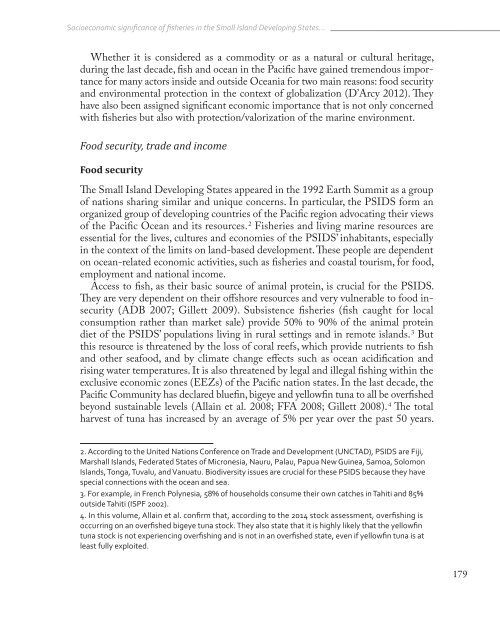Fisheries in the Pacific
Fisheries_in_the_Pacific
Fisheries_in_the_Pacific
Create successful ePaper yourself
Turn your PDF publications into a flip-book with our unique Google optimized e-Paper software.
Socioeconomic significance of fisheries <strong>in</strong> <strong>the</strong> Small Island Develop<strong>in</strong>g States…<br />
Whe<strong>the</strong>r it is considered as a commodity or as a natural or cultural heritage,<br />
dur<strong>in</strong>g <strong>the</strong> last decade, fish and ocean <strong>in</strong> <strong>the</strong> <strong>Pacific</strong> have ga<strong>in</strong>ed tremendous importance<br />
for many actors <strong>in</strong>side and outside Oceania for two ma<strong>in</strong> reasons: food security<br />
and environmental protection <strong>in</strong> <strong>the</strong> context of globalization (D’Arcy 2012). They<br />
have also been assigned significant economic importance that is not only concerned<br />
with fisheries but also with protection/valorization of <strong>the</strong> mar<strong>in</strong>e environment.<br />
Food security, trade and <strong>in</strong>come<br />
Food security<br />
The Small Island Develop<strong>in</strong>g States appeared <strong>in</strong> <strong>the</strong> 1992 Earth Summit as a group<br />
of nations shar<strong>in</strong>g similar and unique concerns. In particular, <strong>the</strong> PSIDS form an<br />
organized group of develop<strong>in</strong>g countries of <strong>the</strong> <strong>Pacific</strong> region advocat<strong>in</strong>g <strong>the</strong>ir views<br />
of <strong>the</strong> <strong>Pacific</strong> Ocean and its resources. 2 <strong>Fisheries</strong> and liv<strong>in</strong>g mar<strong>in</strong>e resources are<br />
essential for <strong>the</strong> lives, cultures and economies of <strong>the</strong> PSIDS’ <strong>in</strong>habitants, especially<br />
<strong>in</strong> <strong>the</strong> context of <strong>the</strong> limits on land-based development. These people are dependent<br />
on ocean-related economic activities, such as fisheries and coastal tourism, for food,<br />
employment and national <strong>in</strong>come.<br />
Access to fish, as <strong>the</strong>ir basic source of animal prote<strong>in</strong>, is crucial for <strong>the</strong> PSIDS.<br />
They are very dependent on <strong>the</strong>ir offshore resources and very vulnerable to food <strong>in</strong>security<br />
(ADB 2007; Gillett 2009). Subsistence fisheries (fish caught for local<br />
consumption ra<strong>the</strong>r than market sale) provide 50% to 90% of <strong>the</strong> animal prote<strong>in</strong><br />
diet of <strong>the</strong> PSIDS’ populations liv<strong>in</strong>g <strong>in</strong> rural sett<strong>in</strong>gs and <strong>in</strong> remote islands. 3 But<br />
this resource is threatened by <strong>the</strong> loss of coral reefs, which provide nutrients to fish<br />
and o<strong>the</strong>r seafood, and by climate change effects such as ocean acidification and<br />
ris<strong>in</strong>g water temperatures. It is also threatened by legal and illegal fish<strong>in</strong>g with<strong>in</strong> <strong>the</strong><br />
exclusive economic zones (EEZs) of <strong>the</strong> <strong>Pacific</strong> nation states. In <strong>the</strong> last decade, <strong>the</strong><br />
<strong>Pacific</strong> Community has declared bluef<strong>in</strong>, bigeye and yellowf<strong>in</strong> tuna to all be overfished<br />
beyond susta<strong>in</strong>able levels (Alla<strong>in</strong> et al. 2008; FFA 2008; Gillett 2008). 4 The total<br />
harvest of tuna has <strong>in</strong>creased by an average of 5% per year over <strong>the</strong> past 50 years.<br />
2. Accord<strong>in</strong>g to <strong>the</strong> United Nations Conference on Trade and Development (UNCTAD), PSIDS are Fiji,<br />
Marshall Islands, Federated States of Micronesia, Nauru, Palau, Papua New Gu<strong>in</strong>ea, Samoa, Solomon<br />
Islands, Tonga, Tuvalu, and Vanuatu. Biodiversity issues are crucial for <strong>the</strong>se PSIDS because <strong>the</strong>y have<br />
special connections with <strong>the</strong> ocean and sea.<br />
3. For example, <strong>in</strong> French Polynesia, 58% of households consume <strong>the</strong>ir own catches <strong>in</strong> Tahiti and 85%<br />
outside Tahiti (ISPF 2002).<br />
4. In this volume, Alla<strong>in</strong> et al. confirm that, accord<strong>in</strong>g to <strong>the</strong> 2014 stock assessment, overfish<strong>in</strong>g is<br />
occurr<strong>in</strong>g on an overfished bigeye tuna stock. They also state that it is highly likely that <strong>the</strong> yellowf<strong>in</strong><br />
tuna stock is not experienc<strong>in</strong>g overfish<strong>in</strong>g and is not <strong>in</strong> an overfished state, even if yellowf<strong>in</strong> tuna is at<br />
least fully exploited.<br />
179


